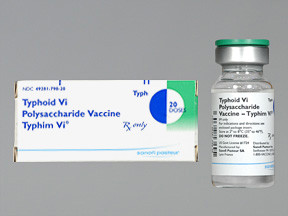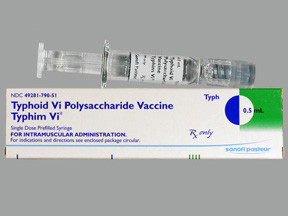TYPHOID VACCINE - INJECTION
PHONETIC PRONUNCIATION:
COMMON BRAND NAME(S): Typhim VI
GENERIC NAME(S): typhoid vaccine VI capsular polysaccharide
Uses
USES: This vaccine is used to help prevent typhoid fever. Vaccines work by increasing the body's natural defense (immunity) against the bacteria that cause the infection. This vaccine is recommended for people who are traveling to areas where the infection is common (e.g., Africa, Asia, Central/South America), those who are in close contact to someone with persistent typhoid infection, and those who work with the bacteria (Salmonella typhi) in a laboratory. This vaccine is used to prevent the disease and will not treat typhoid fever or a persistent typhoid infection.
How to use TYPHOID VACCINE - INJECTION
HOW TO USE: Read all vaccine information available from your health care professional before receiving the vaccine. If you have any questions, ask your health care professional. This vaccine is given by injection into the muscle of the upper arm (for adults) or into the muscle of the thigh or upper arm (for children) by a health care professional. This vaccine should be given as a single injection at least 2 weeks before possible exposure to typhoid fever. It can be given every 2 years thereafter if needed.
Side Effects
Precautions
Interactions
Overdose
Images
Reviews
Faq for TYPHOID VACCINE - INJECTION
The typhoid vaccine in injection form is a vaccine that helps protect against typhoid fever, a bacterial infection caused by Salmonella Typhi.
The typhoid vaccine injection is given as a shot, typically into the muscle of the upper arm. It can also be given subcutaneously (under the skin) in some cases.
The typhoid vaccine is approximately 50-80% effective in preventing typhoid fever, depending on the specific vaccine used. It provides protection against the disease for several years.
The typhoid vaccine is recommended for individuals who are traveling to areas with a high risk of typhoid fever, especially if they will be staying for an extended period or have close contact with the local population. It may also be given to certain high-risk individuals, such as healthcare workers or people with a weakened immune system.
Common side effects of the typhoid vaccine injection include pain, redness, or swelling at the injection site. Some people may also experience mild fever, headache, or nausea. Serious side effects are rare.
The typhoid vaccine injection should ideally be given at least 1-2 weeks before travel to allow enough time for the immune response to develop.
The need for a booster dose depends on the specific typhoid vaccine given. Some vaccines provide protection for several years, while others may require a booster every 2-5 years. It is best to consult with a healthcare professional for the recommended schedule based on the vaccine used.
Yes, the typhoid vaccine injection can be given to children aged two years and older. A different formulation may be used for children compared to adults.
While the typhoid vaccine offers significant protection against the disease, it is not 100% effective. There is still a small chance of contracting typhoid fever even after getting vaccinated. Taking preventive measures, such as practicing good hygiene and avoiding contaminated food and water, is essential.
Disclaimer
IMPORTANT: HOW TO USE THIS INFORMATION: This is a summary and does NOT have all possible information about this product. This information does not assure that this product is safe, effective, or appropriate for you. This information is not individual medical advice and does not substitute for the advice of your health care professional. Always ask your health care professional for complete information about this product and your specific health needs.



No Reviews Yet